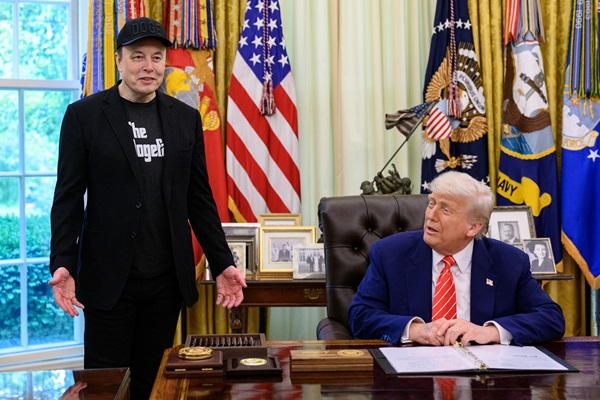.png)
When Champions Face The Music: The Reality Behind India’s Growth Story
Djokovic’s bittersweet Roland Garros loss mirrors India’s economic transition—veteran strategies give way to bold plays in a high-stakes transition game.


Phynix is a seasoned journalist who revels in playful, unconventional narration, blending quirky storytelling with measured, precise editing. Her work embodies a dual mastery of creative flair and steadfast rigor.
June 8, 2025 at 10:01 AM IST
Dear Insighter,
The Philippe-Chatrier court held its breath as Novak Djokovic—tennis’s indomitable GOAT—wiped clay from his brow, defeat etched in the Parisian twilight. At 38, he’d just lost a gruelling semi-final to young gun Jannik Sinner, hinting this might be his Roland Garros farewell. "This could have been the last match here," he murmured, voice thick with emotion, "but it was a wonderful one." The crowd roared, honouring legacy while embracing the new.
Tennis, like economics, is a relay race. The baton passes. The game evolves. And India? India is watching its own high-stakes match, where veteran strategies face agile new realities—with the RBI’s surprise attack as the opening serve.
The Monetary Policy Committee didn’t just adjust rates—it launched a monetary offensive. A 50-basis-point repo rate cut, a 100-basis-point CRR slash, and a pivot to neutral stance—all in one swing.
Kalyan Ram called it a credibility gamble, arguing markets fear a central bank that shifts stance and floods the system prematurely. The BasisPoint Groupthink dubbed it Operation Frontload, likening it to a full-spectrum assault where the RBI fired all weapons, then called for peace. Why the aggression? Inflation’s retreat and an early monsoon created a window.
But as Abheek Barua notes, this is “bold cuts, balanced stance”—RBI’s new dharma of pushing growth while keeping contingency plans holstered. Yet structural frictions linger. Richard Fargose warns that transmission is not automatic, with sticky bank rates and cautious lending threatening to blunt the stimulus.
Amid this drama, Deputy Governor Poonam Gupta—tasked with monetary policy—sat silently through the press conference. The Groupthink piece noted her muted debut, while Srinath Sridharan defended restraint. Authority in central banking is earned through judgment, not decibels.
Yet the pre-policy chatter was deafening. Sridharan blasted headlines that front-run the RBI, comparing speculative forecasts to market theatre. Vivek Kumar, meanwhile, framed India’s economy as a Schrödinger’s cat—simultaneously thriving and fragile until observed. The 7.4% Q4 GDP growth? Dhananjay Sinha calls it ‘too good to trust’, citing weak money supply and revised data. Even GST’s surge, he argues, masks rising tax incidence in a slowdown. Michael Debabrata Patra pushes back, defending GDP as a mirror, not a mirage—but the dissonance is palpable.
Enter Duvvuri Subbarao, former RBI Governor, whose four-part interview anchors this moment. His message? India is a poor rich nation. Celebrating fourth-largest GDP, he warns, is like Djokovic celebrating a break point while down two sets. Per capita income must increase eightfold to $22,000 by 2047—requiring 8% annual growth. But growth alone won’t suffice. "India must share gains equitably," he insists, flagging inequality as the structural weakness that could derail Viksit Bharat. In Part 2, he urges adding external stability to the MPC’s 2026 mandate overhaul; Part 3 critiques RBI’s excessive forex intervention; Part 4 decries fiscal federalism cracks. The full interview (video included) is essential viewing—a veteran’s playbook for the next generation.
Across the world, a lovers’ tiff between Donald Trump and Elon Musk exploded on social media platforms with all the subtlety of a contested line call. After Musk opposed what Trump called the "Big beautiful tax bill," their relationship combusted faster than a Djokovic backhand down the line. Trump's Truth Social posts declared Elon was "wearing thin," while Musk fired back with allegations about Epstein files and threats to decommission SpaceX's Dragon spacecraft. From partnership to public warfare—a masterclass in how quickly alliances can unravel when fundamental disagreements emerge.
But Trump’s real impact? A 50% US steel tariff threatening India’s $4.56 billion exports, as Ajay Srivastava notes. India’s WTO challenge failed, leaving three bleak options: legal battles, retaliation, or folding into FTA talks. Manoj Rane’s chat with ICICI’s B Prasanna hints the dollar’s safe-haven status and corporate earnings face their own tiebreaks.
Krishnadevan V jolts us with another risk: flash crashes. A different kind of transformation is underway in India’s equity markets. Colocation trading now accounts for 38.8% of turnover; algorithmic trades dominate at 57%. Traditional trading desks are shrinking in influence—less than half their share from a decade ago. More speed, less stability. One flash crash away from systemic tremors.
Meanwhile, IMD Chief Mohapatra warns that extreme weather is "the new normal"—floods in Assam, heatwaves in Rajasthan. It’s economic sabotage by atmosphere. Sridharan rejects states levying income tax as a solution to fiscal asymmetry, warning it would fracture sovereignty. TK Arun’s grim outlook—guns over butter—sees global conflicts diverting resources from welfare to weapons, a tradeoff haunting India too.
Even our snacks face upheaval. Krishnadevan V unpacks how FSSAI’s ban on "100%" food claims forces brands to confront and correct marketing ambiguity. No more paying premiums for hollow promises—truth now sits on the label.
Just as Djokovic acknowledged a possible farewell to Roland Garros while confirming he’ll return for more Grand Slams this season, India's policymakers must balance recognition of current realities with a commitment to long-term goals. The challenge isn't avoiding difficult transitions, but navigating them with grace, wisdom, and strategic foresight.
The best players aren't those who never face match point, but those who know how to respond when they do.
Until next week,
Phynix
Yours in strategic transitions.
Also Read
- Stripping ‘M’ From CAMELS Undermines Risk Oversight In Banks by Rabi N. Mishra – Dropping ‘Management’ from bank ratings could blind regulators to culture rot.
- BCCI Can Call Time-Out On India’s Spitting Habit by Krishnadevan V – Can cricket’s gods help clean up India’s dirtiest public habit?
- Is Effective Crypto Regulation Finally Coming? by Howard Davies – A legal path for stablecoins is emerging—slow, but real.
- Making Sense Of The New Global Economy by Dambisa Moyo – As geopolitics weaponises everything, economic forecasting gets harder.
- It Takes A City, Not A Couple, To Run An Indian Household by Srinath Sridharan – The real MVPs of urban India? The invisible workforce keeping households afloat.
- India Attempts to Define Software Patentability, But Leaves Some Grey Areas by Amit Singh – India’s patent draft offers clarity for tech IP—alongside ambiguity.
- Offscript Weekly: Fire In The Skies, Bhangra on Wall Street by Ranjana Chauhan – Jets roared, Wall Street danced, and memes ruled the news cycle.



